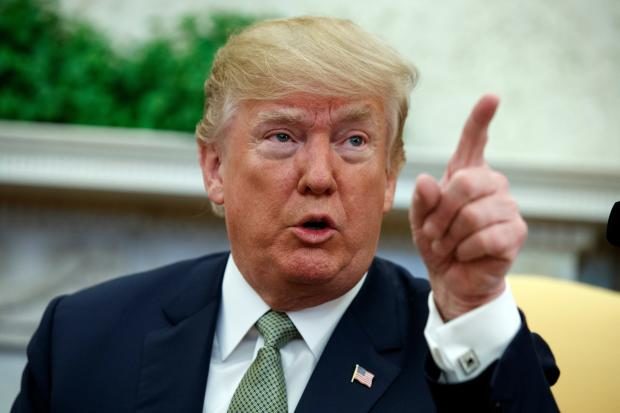
In this photo, taken March 15, 2018, President Donald Trump talks with reporters in the Oval Office of the White House in Washington. AP
WASHINGTON, United States — President Donald Trump warned Monday that Damascus, Moscow and Tehran may be forced to pay a “big price” after the latest alleged chemical weapons atrocity of the Syrian civil war.
The American leader met with his cabinet and vowed to make “major decisions” within the next 24 to 48 hours, amid mounting speculation about a US military response.
In New York, the United Nations Security Council met after Washington urged the international community to approve a probe into the alleged attack on rebel-held Douma that reportedly killed at least 40 people.
Earlier, Trump condemned what he said had been a “heinous attack on innocent” Syrians, after reports emerged of women and children choking to death in agony, adding: “This is about humanity — it can’t be allowed to happen.”
Asked whether Russia’s President Vladimir Putin bore some of the responsibility for the latest attack to be blamed on his ally Bashar al-Assad’s regime, Trump said: “He may, and if he does it’s going to be very tough.”
“Everybody is going to pay a price. He will. Everybody will,” the US president added.
White House spokeswoman Sarah Sanders later made the warning even more explicit, saying: “Russia and Iran also bear responsibility for these acts since they would not be possible without their material support.”
Chemical watchdog
On April 7, 2017, almost exactly a year ago, Trump ordered the US Navy to target a Syrian airbase with cruise missiles in the wake of a similar attack that the UN chemical weapons watchdog OPCW later pinned on Assad’s regime.
At the United Nations, Ambassador Vassily Nebenzia said Moscow had formally warned the United States that it would not allow its forces on the ground in Syria to be put at risk.
“Armed force under mendacious pretext against Syria… where Russian troops have been deployed could lead to grave repercussions,” Nebenzia said.
But US envoy Nikki Haley demanded action. “We have reached the moment when the world must see justice done,” she declared.
Washington’s main European allies stood by reports blaming Assad. France’s President Emmanuel Macron has promised a “strong, joint response” and Britain has joined a growing chorus demanding action.
British Foreign Secretary Boris Johnson spoke by telephone with acting US secretary of state John Sullivan and, according to London, they agreed that “this attack bore hallmarks of previous chemical weapons attacks by the Assad regime.”
As the UN debate took place, a huge blast tore through a multi-story building in the jihadist-held city of Idlib, in northern Syria.
The cause of the explosion was not immediately apparent, but the Britain-based Syrian Observatory for Human Rights said 13 people had been killed and another 80 wounded.
With Washington and Paris expected to respond, an apparent Israeli strike on a Syrian regime air base early Monday initially raised speculation that US punitive raids had already begun.
Tehran later confirmed that four of its personnel were killed in the strike, underlining the international nature of the conflict and the risk of escalation if and when the West takes action.
Investigation launched
Rescuers and medics in Douma say more than 40 people died after an alleged poison gas attack late Saturday in the last rebel-held pocket of the one-time opposition stronghold of Eastern Ghouta.
Access to the area, which has faced weeks of regime bombardment, is limited and AFP has not independently verified the accounts.
The Organization for the Prohibition of Chemical Weapons said it was investigating the allegations but that so far only a “preliminary analysis” had taken place.
Since February 18, Syrian regime forces have been carrying out an offensive against Ghouta that has killed more than 1,700 civilians and cornered rebels in their last holdout of Douma.
After capturing most of Ghouta, Syria and Russia secured two negotiated withdrawals last month that saw 46,000 rebels and civilians evacuate.
Following fraught negotiations and a concentrated regime bombing blitz, state media announced Sunday a deal was reached for Jaish al-Islam to leave Douma within 48 hours and release hostages.
Several buses of detainees arrived in Damascus overnight after having been freed by Jaish al-Islam, and rebels were being evacuated in a parallel operation on Monday, SANA said. /cbb